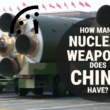Missile proliferation—and ideas that might work
By Waheguru Pal Singh (WPS) Sidhu, July 7, 2016
It's not so hard to agree that missiles pose significant challenges to international peace and security. Agreeing on how to address those challenges is more difficult.
Missiles, as my roundtable colleagues Masako Ikegami and Sitki Egeli eloquently concur, pose at least three sets of challenges. First, the actual use of nuclear-tipped missiles would be devastating for international peace and security; any threat to use nuclear-tipped missiles would seriously undermine stability; and the actual use of advanced, precisely guided, conventional missiles is also perceived to be a threat, especially by states that are targeted by such attacks. Second, missiles are not banned—and, with a few notable exceptions, missile proliferation has never been reversed. Third, existing arrangements to rein in missile technology and trade, notably the Missile Technology Control Regime, are inadequate or ineffective.
So what can be done?
Ikegami focuses on the links between missiles and nuclear weapons. She urges that "missile nonproliferation and nuclear disarmament [be addressed] as two inseparable elements of the same agenda." There is, of course, a direct correlation between missiles and nuclear weapons: All nine nuclear weapon states possess missiles. All possess nuclear-armed or nuclear-capable ballistic missiles. And almost all possess or are now acquiring nuclear-capable cruise missiles. But not all states that possess ballistic and cruise missile also have nuclear weapons. Indeed, given the growing accuracy and lethality of conventionally armed missiles, many states that lack nuclear weapons would like to have long-range missiles. This presents a tough question: If a state has missiles, particularly ballistic missiles, does it aspire to acquire nuclear weapons? The answer has to be a qualified "maybe." To be sure, nations such as North Korea, Iraq, Libya, and Iran, which possess missiles, also sought nuclear weapons. (And all these nations were signatories to the Nuclear Non-Proliferation Treaty when they began seeking nuclear weapons.) But, on the other hand, is it likely that Armenia, which has ballistic missiles, will make a push for nuclear weapons?
In any event, creating a global regime to control or eliminate nuclear-capable missiles is easier said than done. The rare instances in which arms control or disarmament measures have been applied to nuclear-capable missiles—the Intermediate-Range Nuclear Forces Treaty, or the UN-led disarmament of Iraq, South Africa, and Libya—resulted from very specific circumstances, and involved no global norm or regime. And even the case-by-case approach to missile proliferation appears to be failing where North Korea and Iran are concerned—despite the engagement of the UN Security Council's permanent members.
Egeli's proposal to focus on longer-range missiles when crafting export and technology controls seems similarly unlikely to achieve its aims. Just as civilian and military nuclear technologies overlap to a large extent, multi-stage missiles and multi-stage civilian space launch vehicles have a significant overlap. Thus countries that have or seek to develop legitimate civilian space launch programs—and some of these countries are members of the Missile Technology Control Regime—might be reluctant to sign on to such a proposal. Moreover, countries such as Israel see greater danger in shorter-range, conventionally-armed missiles in the hands of non-state actors than in longer-range missiles.
Egeli's proposal to limit and ideally eliminate missile tests would encounter similar problems. Such a regime would require universal compliance—an improbable outcome because established missile states such as the United States and Russia would likely resist. So would recalcitrant states such as North Korea, which is already in open defiance of a missile test ban imposed by the UN Security Council.
Instead of pursuing ambitious recommendations that are unlikely ever to succeed, it is better to consider the less imaginative suggestions advanced by the 2008 UN Panel of Governmental Experts on "the issue of missiles in all its aspects." To be sure, these ideas might be criticized for lacking ambition—but they do enjoy consensus agreement among almost all the significant missile powers (the panel's 23 members having included experts from, among other nations, China, Iran, India, Israel, Russia, and the United States, though not North Korea). The panel, for example, called on nations to improve their controls over the transfer and export of missiles and related technology. It encouraged states to report missile-related information through UN reporting mechanisms. It called for enhancing global and regional security through, for example, the peaceful settlement of disputes. Additionally, the panel encouraged nations to adopt "voluntary transparency and confidence-building measures … [to enhance] predictability." Again, these ideas offer little excitement or boldness of vision. But in addressing the difficult security problems posed by missile proliferation, they might be a good place to begin.
Topics: Nuclear Weapons, Technology and Security
Share: [addthis tool="addthis_inline_share_toolbox"]














